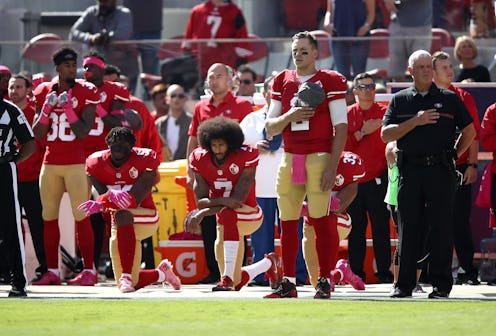News
Why California's NAACP Says The National Anthem Is Racist And Wants It Removed

In recent years, the national anthem has become the focus of controversy as professional athletes use the song as a platform for protest at athletic events. Now, the California chapter of the National Association for the Advancement of Colored People (NAACP) will demand Congress remove "The Star-Spangled Banner" as the country's national anthem, calling the song "one of the most racist, pro-slavery, [and] anti-black songs in the American lexicon."
According to the Sacramento Bee, the California state chapter of the NAACP passed two resolutions last month. One seeks to urge Congress to rescind "The Star-Spangled Banner's" status as the national anthem. The other supports former San Francisco 49ers quarterback Colin Kaepernick, who became a highly polarizing figure in 2016 when he stopped standing for the national anthem in protest of the oppression of people of color. Last week, the California NAACP reportedly began circulating their resolutions among state legislative offices in an effort to drum up support before the start of the 2018 legislative session in January.
"We are not anti-flag," California NAACP President Alice Huffman told Bustle in an emailed statement. "However, when 'The Star-Spangled Banner' was written it did not include us African-Americans. Most Americans only know the first part of the song but [the song's author] added a third stanza to the song right after America lost the battle in 1815 decrying the former slaves who were now working for the British army."
In their resolution the California NAACP argues the national anthem is racist due to the song's third verse, which although not often sung includes the following passage:
Their blood has washed out their foul footsteps' pollution.
No refuge could save the hireling and slave
From the terror of flight, or the gloom of the grave
Some have interpreted the verse to be an expression of disdain for the black slaves who, upon the promise of freedom, fought alongside British Forces in the War of 1812. Indeed it's hard to argue that there aren't racist undertones in a line effectively claiming the "foul footsteps" of black men polluted American soil. Moreover, Francis Scott Key, the man who wrote "The Star-Spangled Banner" is also known to have been a bigot responsible for helping incite the first race riot in Washington, D.C. in 1835.
"I'm embarrassed that I have participated in supporting this song since I was a child," Huffman told Bustle. "It was negative toward me and my race! For these reasons and more, we are calling for this song to be removed as the National Anthem."
According to the Sacramento Bee, Huffman decided to draft the two resolutions recently passed by the California NAACP after President Donald Trump injected himself into the controversy surrounding athlete's national anthem protests earlier this year. In September, Trump urged NFL owners to fire players who refuse to stand for the anthem.
"Wouldn't you love to see one of these NFL owners, when somebody disrespects our flay, to say, 'Get that son of a bitch off the field right now,'" Trump asked the crowd at a Sept. 22 rally for Alabama Republican Senate candidate Luther Strange. "He is fired."
For the moment, it's unclear if any state legislators will take on the task of bringing the California NAACP's resolution before the state assembly or how the organization aims to take the matter to Congress, which officially adopted "The Star-Spangled Banner" as the nation's national anthem in 1931. The California NAACP has argued that changing the national anthem to a song which does not marginalize any part of the American population isn't as monumental a task as some might think.
"This song is wrong," Huffman told local CBS affiliate KOVR-TV. "It should never have been there, and just like we didn't have it until 1931, it won't kill us if it goes away."